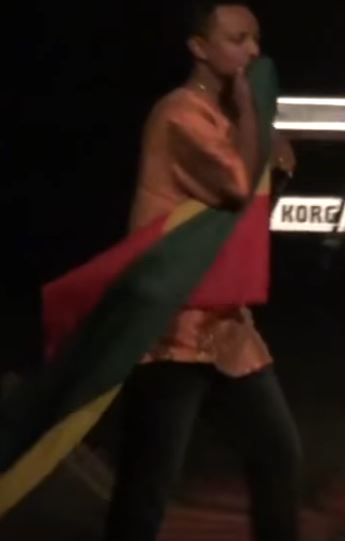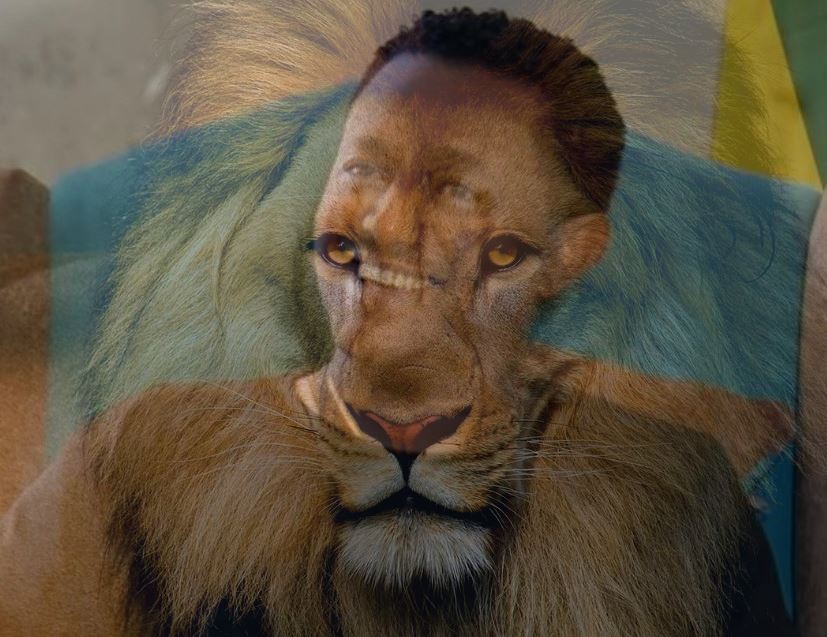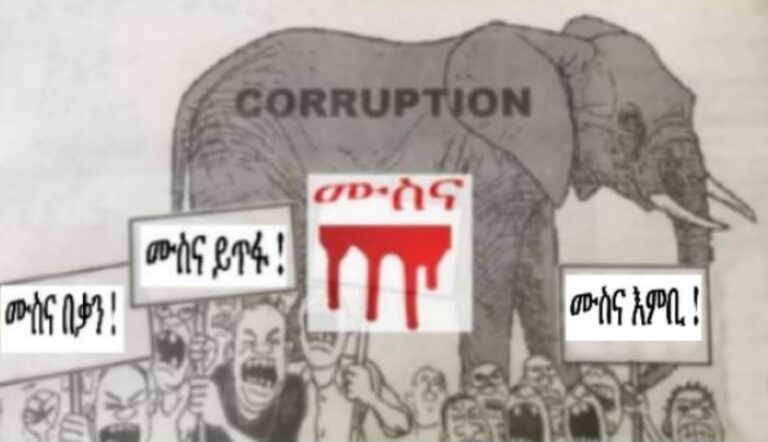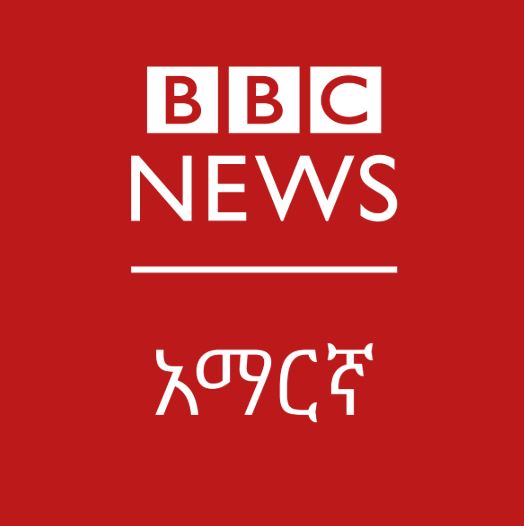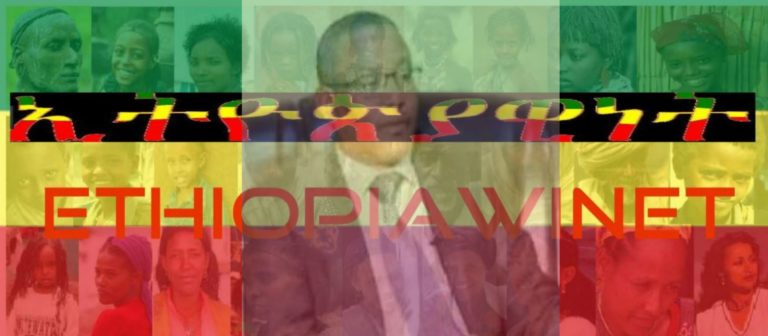EthiopiaWIN.et and Tewdros Kassa-hun
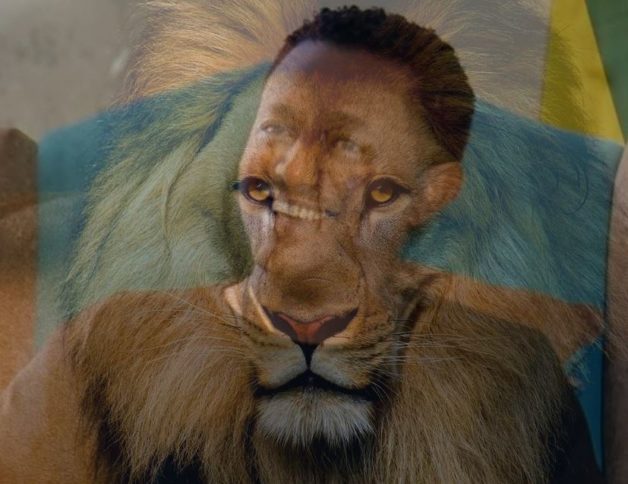 Author’s Note: This month the Ethiopian popular music megastar Tewdros “Teddy Afro” Kassahun released his “Ethiopia” album, which quickly topped the World Albums Billboard chart during the week of May 15. This “commentary” consists of an English translation of Tewdros’ recent Amharic interview with reporter Elias Meseret of EthioNewsflash following the release of that album.
Author’s Note: This month the Ethiopian popular music megastar Tewdros “Teddy Afro” Kassahun released his “Ethiopia” album, which quickly topped the World Albums Billboard chart during the week of May 15. This “commentary” consists of an English translation of Tewdros’ recent Amharic interview with reporter Elias Meseret of EthioNewsflash following the release of that album.
I have prepared this translation for two reasons: 1) to help young Ethiopians in the Diaspora who do not speak or understand Amharic get a glimpse of the musical genius of Teddy Afro, and 2) acquaint them with the metaphysics of “Ethiopiawinet”, a state of being and consciousness, a philosophy and way of life, a system of beliefs and praxis of being Ethiopian. I do not believe there is anyone today who can explain Ethiopiawinet (“Ethiopianity”) better than Tewdros Kassahun. Certainly, no one better to communicate it to the younger generation. I also hope to introduce this musical legend to my global readership so that they too may appreciate and enjoy his music as millions have come to appreciate Ethiopian cuisine throughout the world. “If music be the food of love, play on,” wrote Shakespeare.
I would not presume to articulate Tewdros’ philosophy and practice of “Ethiopiawinet” here. “Unhappily, I possess neither that eloquence of diction, that poetry of imagination, nor that brilliance of metaphor” Tewdros has to tell my readers what Ethiopiawinet means. To me, Ethiopiawinet simply means Ethiopia WIN Et hiopia.
In my view, for Tewdros, Ethiopiawinet is about what we ought to be as Ethiopians, what we can be, what we will be and what we must be. To Tewdros, I believe, Ethiopiawinet is a rallying point for all Ethiopians “to build courage when courage seems to fail; to regain faith when there seems to be little cause for faith; to create hope when hope becomes forlorn”; and to believe — to believe without hesitation or evasion — that all Ethiopians are bound by a single golden yarn of destiny and that the best days of Ethiopia are yet to come.
To me, and I believe to Tewdros, that is what Ethiopiawinet is all about.
As I have studied Tewdros’ lyrics in his “Ethiopia” album, I have been captivated and enraptured by the aesthetics of the idea of Ethiopiawinet. But Ethiopiawinet is more than an idea. It is a defining civic virtue, a set of values that define the essence of Ethiopian identity. But it is indeed much more than a virtue. It is a complete experience unlike any other. It is a credo which embraces every Ethiopian into the collective Ethiopian brotherhood and sisterhood. Ethiopiawinet is ultimately about the dignity, personhood and humanity of being an Ethiopian. It is a unique collective consciousness and self-consciousness about being an Ethiopian. It is about the roots of what makes Ethiopians, Ethiopians.
In his “Ethiopia” album, Tewdros preaches Ethiopiawinet with poetic eloquence, polished diction, passionate patriotism (love of country and compatriots), and unabashedly proclaims his unseverable attachment to Mother Ethiopia by a primordial umbilical cord.
I am overawed not only by Tewdros’ unsurpassed musical genius and prodigious creativity, but even more compellingly, I am mesmerized by the depth and breadth of his understanding and extraordinary discernment. Tewdros is not just a musician, he is a deep thinker who speaks in lyrical poetry.
Tewdros is a man who practices his credo of love, compassion and understanding, tolerance, forgiveness and reconciliation in his music. Tewdros Kassahun is a man for all seasons.
In America in the 1960s, Bob Dylan (2016 Nobel laureate for literature) was the voice of the young generation.
I hereby proclaim and declare Tewdros “Teddy” Kassahun the voice of Ethiopia’s young generation today!
On a personal note, perhaps the most poignant and deeply touching songs on the “Ethiopia” album is “Atse Tewdros”, in tribute to Emperor Tewdros II of Ethiopia from 1855-1868. That song speaks of the Emperor’s contributions and sacrifices to create a united Ethiopia from a bunch of feuding principalities and kingdoms. Atse Tewdros birth name was Kassa Hailu. Tewdros Kassa Hailu.
In 2017, Tewdros Kassa-hun carries on the spirit of Tewdros Kassa Hailu and sings to the heavens about the oneness and unity of Ethiopia. He makes sacrifices and contributions in the cause of the unity of the Ethiopian people.
Ironic how art imitates life!
Teddy is our man for all seasons. That is because it takes great courage to sing and speak truth in a Kingdom of Lies. Telling the truth about Ethiopiawinet as Teddy does, is in my view, the ultimate act of humanity in this day and age. Aleksandr Solzhenitsyn said, “The simple step of a courageous individual is not to take part in the lie.”
What does a nation owe a man who not only has the courage to tell the truth with poetic delicacy but also refuses to take part in a Great Lie, come hell or high water?
Journalist Biruk Endale resigns over censorship of Teddy Afro Interview
*** A few days ago, Biruk Endale, a journalist at “state owned Ethiopian Broadcasting Corporation (EBC) for the past four years” resigned in protest against censorship of his interview with Teddy Afro. In his single sentence resignation letter, Biruk stated, “Due to recent controversies [censorship involving my Teddy Afro interview scheduled to air], I no longer have the moral justification to continue in my job [with state media] and forthwith voluntarily resign my position.”***
Translation note: I admit my translation herein is imperfect, to say the least. I do not even pretend to capture Tewdros’ sheer poetic eloquence, brilliant diction, depth of ideas, powerful expressivity, unquestioned command of the language, razor-sharp wit, captivating vivacity and mesmerizing oratorical prowess. But I make a sincere effort, to the best of my ability, to present his views with as much fidelity to his words and what I sincerely believe to be his intentions. Any errors in translations are exclusively my own.
Below are translations of the lyrics to the title song “Ethiopia” and the interview.
The 14-track “Ethiopia” album is available for digital download for the incredibly low price of USD$10 HERE.
==================
“Ethiopia”
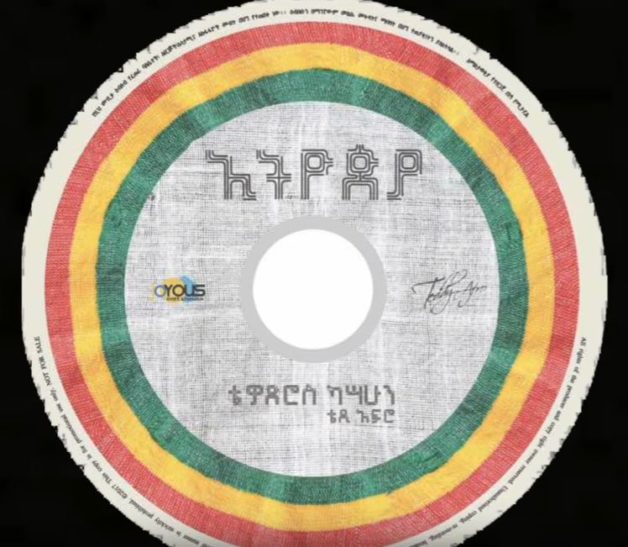
Even if I pass [die] away
My motherland [Ethiopia]
She [remains] is my honor
Indeed, [she is] my [mother] country.
So many have died
Guarding your [her] honor
Against those who have crossed seas
To dishonor you [her].
You are the land of heroes
[Land] Where Adam left his footprints
The fountainhead of Ghion [river mentioned in Ch. 2, Genesis]
[From where] your name is called out.
Not only those who see your flag waving in the sky
Even those who hear the name “Ethiopia” [dare] keep quiet
Not only those who see your flag waving in the sky
Even those who hear the name “Ethiopia” [dare] keep quiet.
With your rainbow [shining]
The sky draped with your flag
Your symbol is imprinted on the palm of the world
And known [even] to Aryam [Ge’ez: sky above all skies, heaven].
Mountain [ranges] of high peaks
Have stood guard over you
[From] The peak of mountains
That citadel of Axum, Ethiopia.
You are the gate to Creation
The [beginning] chapter for the round world
If [rainbow] colors are seen across the sky
It is hers [Ethiopia’s] and no one else’s.
Even though the world calls her [Ethiopia] backward today
She will be the front runner of the coming age
Just let me repeat her name over and over
Isn’t Ethiopia my own name?
If there is less food [injera] on the table [Ethiopia is poor]
Is it possible to trade one’s [poor] mother for anything else
I will hold tight on her skirt
And never give up hope in my mother.
Before [I] finish paying her [Ethiopia] for all her favors
Should not people say [shout out] “Unity” when they hear [the name] Ethiopia
Ethiopia! Ethiopia! My country!
Isn’t my honor because of you?
You are the seed of Solomon
Tears of the holy ones from which your leaf sprouted
It should be nothing new [not be surprised] today to those
Who touched [provoked] you to be burned by the fire they lit.
Without any limitation to your glory
In the book of your heritage with the history of the spirit of the ages [written]
The prophets saw you from afar and wrote in their books:
“Don’t touch Ethiopia!”
In the north
In the south
In the east and in the west
May your bounty be full!
Begone hardship [misery] from the land [Ethiopia]
Let your bounty be full!
Begone hardship [misery] from your land [Ethiopia]
Let your bounty be full!
=====================
Teddy Afro: Prophet for a new Ethiopian generation? Or Philosopher-poet?
First things first. I am Teddy Afro’s #1 fan! No questions about that! I will arm wrestle anyone, anywhere who says otherwise.
I watched Teddy Afro for the first time at the Proud Bird in Los Angeles in 2010 during his triumphant “Love Conquers All” world tour.
I talked about that experience in my commentary, “Proud Teddy at the Proud Bird in L.A.”:
I have listened to Teddy Afro on CD and viewed his Youtube videos countless times. His voice, his message and powerful lyrics and his melodies have moved me, rocked me, soothed me and lifted me up when I was down. But there is nothing that compares to watching this young musical genius live. The difference between watching Teddy live and listening to him on CD/Youtube is the difference between listening to gospel music on the radio and singing it in the choir with the preacher directing. The Proud Bird concert was a quasi-spiritual experience, almost like being at an old time southern Baptist revival. His audience was not only passionately and emotionally involved with the lyrics and melodies, they were spiritually bonded to him with some invisible gravitational force. There was not a single person at the concert who was not movin’, swingin’, rockin’ and rollin’ and groovin’.
Seven years ago, Teddy taught us how love conquers all and how Jah, Yasteseryal (God forgives, reconciles if we atone, Leviticus 16:6; 11; 24!)
In 2017, Teddy takes us to new heights, Ethiopiawinet.
Elias Meseret of Ethio Newsflash: First, tell us about your new album. What sorts of issues does it encompass?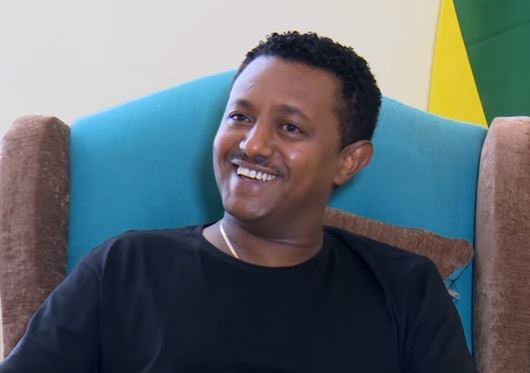
Teddy: [The main thing is] to save Ethiopiawinet from danger. That is the big foundation [for the album]. The reason I decided to make this album, or the thing that encouraged me to contemplate on this [Ethiopiawinet] is [the belief] that above all else, our Ethiopian unity is an essential [most important] thing. [I have] labored many years on [to produce] this album on Ethiopiawinet.
As is well-known now, instead of organizing around ideas, they are organizing around ethnicity. To dwell on things that have happened in the past [historical grievances] [exposes] us to grave danger. So above all else [the foundation for the album] is [the realization] that it is important to save Ethiopiawinet. Such was the aim when the album was made.
Elias: How many copies of the album were sold?
I do not know how many copies are sold. Only the publishers of the album can answer that question. But the fact that it has been extraordinary [in terms of popularity and distribution] is something, I think, everybody can see. I know during the first run, there were some 600 thousand copies [of the album] pressed. But I don’t know anything about how many other copies were made beyond that.
Elias: Did you expect the kind of extraordinary popularity [reception] the album got?
Teddy: Most of the time, the reward [for creative work] is the happiness you get from the work you have done. After that, when your effort becomes successful, that also gives you much happiness. But I never imagined it could be as [massively] popular as it has.
Elias: Some of the songs on the album focus on Ethiopia’s historic leaders. What was the reason that necessitated that?
Teddy: A country stands because of the sacrifices and contributions of patriotic individuals and other elements of society. As is well-known, Ethiopiawinet is the emblem of living free. It is a symbol of freedom for many people who never experienced freedom [implied reference to colonial Africa]. It is necessary to have a great leader like Menelik [Emperor Menelik II (1844-1913)]. It is impossible to say [today] if we can talk about a country we call Ethiopia without [the sacrifices and contributions] of great kings like Atse Haile Selassie [Emperor Haileselassie I, (1892-1975)] who [toiled] from the time of the League of Nations [estab. 1919], and the kinds of contributions and great deeds they did for the country gaining acceptance for [Ethiopia] throughout the world. Without their efforts, it is impossible to say the country we call Ethiopia could exist [today].
Regardless, to the extent kings stand for their people, [they and] those who serve under them [offer] a big window that enables us to see the contributions of the people who were standing in the vanguard [defending the country]. Therefore, first, if we do not give proper respect for historical figures [leaders] and symbols, the next generation will not have anything to inspire them.
Secondly, over the past so many years, Ethiopian history, the feeling of national identity has faced extreme challenges in various ways. So to strengthen [national identity and unity] and to bridge the gap, it is necessary to have a generational movement [of Ethiopiawinet]. As I am a member of this generation, I tried to do that [in my album].
As is well-known, Atse Tewdros, at one point during the rule of princes, when Ethiopia was divided up by ethnic leaders and warlords, began with a dream of uniting Ethiopia. He faced great difficulties not only from outside but also inside. He was a great hero who fell [in battle fighting those trying to colonize Ethiopia.] [Unlike] any time in the past, I believe the spirit of Tewdros [unity] is necessary today. Our thinking must be as great [wide] as our country. That is the reason we have to think of a united country. We are all born in the same country [Ethiopia]. We all live in the same country [Ethiopia]. It is to point out this fact, that I undertook my efforts around the album.
This [concern for Ethiopian unity] is not just based on my belief, it is based on the objective situation. No one can say they are apolitical [uninvolved]. Secondly, to raise political issues should not be regarded as a sin. Since all of us are going on the same journey, [and face similar] economic, social and political issues, it concerns all of us. To focus around these issues and to get involved is a [civic] culture that needs to be accepted [nurtured] and encouraged. That is what I believe. It is from this perspective that I made the album. The depth and the focus [with which I have addressed] the issues is detailed in the album. It is difficult to mention all of them [issues]. That is the situation now [how it is].
Elias: Some people say Teddy Afro’s music is focused on certain segments of the [Ethiopian] population. Others say, he does not properly understand Ethiopian history. What is your view on this?
Teddy: For all of us, Ethiopia is our manifestation. There is a segment that chafes [does not accept] against [the idea] of Ethiopiawinet. It is necessary to accept this truth. It is not possible to make everybody happy. One has to assess which one is the valuable and practical way out [solution] and focus on what one believes is right and proceed forward.
Therefore, there may be different types of positions [views] taken on [Ethiopiawinet]. As you can see, everybody who has Ethiopiawinet inside them, [will forever] have it in them. That can never be lost. It is as deep as religion. Ethiopiawinet has a delicate mystery to itself. It has a very deep foundation.
When we can agree on so many good things, it is not useful to dwell on the deficient things we have done together. I have a young son. He is 4 years-old. This child, if I ask him to tell me about love or hate, he will tell me about love. If I ask your son which he prefers between unity and division, he will tell you unity is better. This question that little children can answer, [it escapes] those of us who are older adults. We have reached a point where we [prefer to] focus on things we disagree on [divide us]. This is how the journey of many young people has been obstructed. This is also the pressure of the older generation. But our forefathers were people who were far better than what we have [become]. That is why my work focused on them. It is a natural right of everyone to express their views. Even though it is not possible to make everyone happy, I have tried to present things that will promote general understanding [unity] of all people [of Ethiopia].
Elias: You have said that you have been inspired by Bob Marley and other artists to deliver a political message.
Teddy: All of us have our inspirational foundation. Musically, [artists] like Bob Marley in Reggae, others like Tilahun [Gessesse], Mahmoud [Ahmed], Alemayheu Eshete, [left their legacies]; but their taped music is what we have [left]. That is how the [previous generation of artists] have done it passing it on to the next one. Other than that, based on my ability and the talent I have and efforts I make, I try to work hard and strive to reach a good result. Beyond that, for me to say I have achieved this or that [is not appropriate]; it is better for others to speak of what I have done. I don’t feel comfortable talking about. All I can do is do what I know [best] and keep moving forward.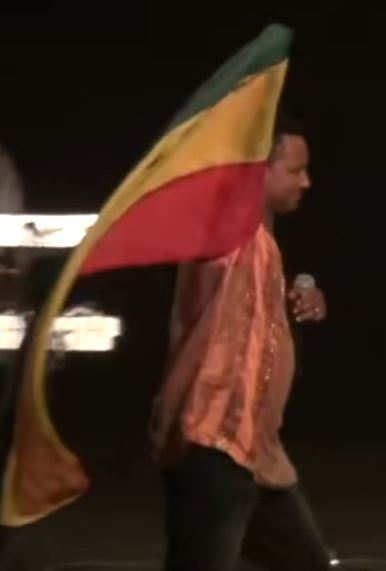
Elias: Do you have any plans to get involved in Ethiopian politics in the future?
Teddy: It is better for us [me] to do what we [I] do best. We will see what happens in the future when we get there.
Elias: What would you say were the problems you faced when making the “Ethiopia” album?
Teddy: Even though it cannot be said that the [album] was completed in a short time, it took two years to complete the studio work. Before that, I had to prepare the melody and lyrics at home. I used to work every day. The major problems I had were sleeplessness and having proper diet. Other than that, I finished it in a very good way. I finished in a happy way.
Elias: Do you have any short-term plans to have concerts inside or outside the country?
Teddy: It is possible in the future, but now it is necessary [for me] to step away and take a rest. Adequate rest. After that, to get ready for a [concert], it is necessary to do some studying [preparation]. As you know, members of our band live abroad. After they get here, they will need a minimum of one month preparation. With proper preparation, even with better preparation than before, we have plans to elevate the performance level. And this requires some time.
Elias: Do you have any concerns that any concerts you may have could be endangered [stopped] by [arbitrary] government action?
Teddy: When such things [public concerts disallowed by arbitrary official actions] happen to you, you get used to it. You learn to balance emotions. But it is inappropriate to disallow concerts. It is not proper to disallow concerts without a good reason. Those authorities who are responsible for such things should consider this [arbitrary denial of permits for concerts.] As a citizen, as a human being, it is proper for us to present our music [to the public] just like any other ordinary musician. It is proper for us to be given permission [to have a concert]. [It should be noted] we have not apologized for any concert denials of previous requests we have made. We suffered a lot of financial losses, material harm [from the denials]. This is not a proper thing to do. I believe this needs to be improved.
Elias: Finally, what things do you wish for Ethiopian people in terms of social and economic matters?
Teddy: Above all things, there has been an enormous inter-generational price paid [to have] one country, one people. Particularly, the price paid by our fathers is not something that can be mentioned lightly. They were extraordinarily decent people. They had a broad and complex understanding of things. They had a high level of understanding. They had intellectual capacity that challenged those who lived in the most civilized countries. They are not just war heroes who defeated the enemy. They challenged the international forums [League of Nations appears to be implied]. They stood for truth and strove to implement the principles [appears to refer to the Covenant of the League of Nations, 1919]. They were such decent people [who believed in the rule of law]. They challenged and scrutinized [the Westerners] them to the core [on the issue of rule of law].
So, living in a country where such great people are not honored, it is not possible to have a generation like them to be born. While drowning in [foreign] debt, we cannot secure a country. This is what I believe to be a national problem for all of us. Which way are the youth going? Who is showing them the way?
Therefore, the first task is to save our country. That takes priority over all things. All things have a process about how things come one after the other. The first thing is we have to save Ethiopiawinet. If we do not save Ethiopiawinet, it is impossible to create a country where anyone can live [all is lost].
To bring about economic change, the people have to unite. [We] had a united force that was brought together to fight [and defeat] the [Italian] enemy at the Battle of Adwa [1896]. It is just as possible to put such a united force together now for purposes of development [to defeat poverty]. And this is the way to follow as well. So there are such deficiencies in the way things are done [today].
Second, [Ethiopian] young people want to be educated and change and improve themselves. Young people need someone who can show them the way. It is a tragic generation. It is because we [I am] are members of that generation that we are forced to focus on this problem. What I wish for the future of my country is that Ethiopia becomes a country where her children are united and a country where people who have toiled for their country are honored. When we honor those who have toiled for their country, then it is possible to create a generation that can [itself] create a great country. We should avoid [violent] conflict at all costs, [and take the path] of forgiveness, love and love of country, in unity, for our people who have deep foundation. It is necessary to get ready and mobilize for a long journey.
Ethiopiawinet is very far away [needs great effort to achieve]. It is necessary that the standard of living must improve for all of us. For this purpose, we must all cooperate [and work together]. If we cannot cooperate, if we do not support [respect] our history, if we do not support [uphold] our identity, if we don’t support [come together in] our unity, if we don’t support [practice] tolerance, if we don’t have closeness, how is it possible [for us] to make the long journey [to Ethiopiawinet] together?
People [Ethiopian] who once tried to unite Africa, are today suffering because it [they] cannot unite itself [themselves].
There is an incredible situation. There are those [Ethiopians] who live in the United States of America [today], people who benefitted from living in a society where there is great diversity, they are now preaching [division and hatred] to people in Ethiopia who have barely anything to eat. It may be their right to say it [hateful and divisive things]. But we cannot pass it without telling them the grave danger that can come from what they are saying.
Therefore, we [Ethiopians] want peace. We love our country.
Ethiopiawinet is not how they have presented it, jumbled up color. It is delicately sophisticated. It is valuable [way of life] not only to us but also others. For Ethiopians to be united is not beneficial just for us, our people [unity] also have the potential to benefit [unity] all of Africa. They [Ethiopians] are paralyzed [today]. To save them, I believe, is my obligation, your obligation and everyone else’s obligation [to promote and defend Ethiopiawinet].
Thank you very much.
=================
God bless Ethiopiawinet and Ethiopia!!!
God bless Tewdros “The Ethiopian Lion” Kassahun!